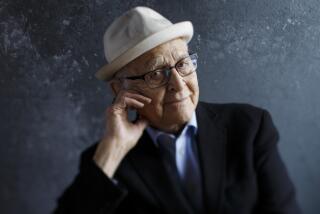Lear Siegler OKs $2.1-Billion Buyout by Forstmann, Little
- Share via
Lear Siegler, the Santa Monica conglomerate that has been a takeover target for two months, agreed Wednesday to be acquired by a New York investment firm and members of Lear Siegler’s management for $2.1 billion in cash.
The investment group, being organized by Forstmann, Little & Co., said it would pay $92 for each of Lear Siegler’s 1.78 million shares and $230 for each of its 175,000 preferred shares.
The deal ends several turbulent weeks for Lear Siegler during which a $93-a-share merger agreement with Wickes Cos. collapsed after Wickes failed to obtain financing. Another suitor, AFG Partners--an investment firm formed by Irvine glass manufacturer AFG Industries and the Wagner & Brown oil and gas partnership--withdrew its $85-a-share bid on Monday.
Lear Siegler’s shares soared in composite trading Wednesday on the New York Stock Exchange. Its shares closed at $89.625, up $14.125.
“This transaction satisfies our board’s objective of delivering optimal value to our shareholders,” Norman A. Barkeley, chairman and president of Lear Siegler, said in a statement.
Theodore J. Forstmann, general manager of Forstmann, Little, praised Lear Siegler’s management as “outstanding” in a prepared statement. Neither Forstmann nor Barkeley was available for further comment.
‘Maintain Its Independence’
Howard A. Rubel, an analyst who follows Lear Siegler for the Cyrus J. Lawrence investment firm in New York, said the buyout represents a “way for Lear Siegler to maintain its independence and give good value to shareholders in a clean, orderly fashion.”
Lear Siegler and Forstmann, Little declined to identify the Lear Siegler executives who are participating in the buyout.
Forstmann, Little is a privately held investment firm that specializes in leveraged buyouts. In such a buyout, a company is purchased with borrowed funds and its assets or cash flow are pledged as collateral.
However, the buyout group didn’t disclose how it would finance the deal. In a statement, the group said that the deal was “fully financed” and that the purchase price included the refinancing of some Lear Siegler debt.
Rubel, the Cyrus J. Lawrence analyst, said Lear Siegler should have little difficulty financing the deal from its own cash flow. He said the company would no longer have to pay a $36-million yearly dividend on its common shares, and its $170 million in operating earnings “is by itself enough to support $1.7 billion in debt.”
The Lear Siegler acquisition came two days after AFG Partners withdrew its $1.5-billion offer for the company because of uncertainties about the way such an acquisition would be taxed under the new tax code. On Wednesday, a spokesman for AFG Partners said the company remained int1701995891automotive parts, and the Smith & Wesson handgun business.
Seen Retaining Core Businesses
However, investment analysts familiar with the company said it is unlikely that the buyout group, which calls itself L Acquisition Corp., would sell its specialty glass, automotive, aerospace or factory automation businesses to finance the sale. “Those are their core businesses, “ Rubel said. “If they wanted to sell them to AFG, they could have done that already.”
Katherine Stults, an analyst who follows Lear Siegler for the Dean Witter Reynolds investment firm in New York, said the buyout group might sell some of Lear Siegler’s smaller businesses to help finance the acquisition. “But as a private company, there will be less pressure on them to blow out businesses at bargain prices. They may not sell anything for a while.”
Lear Siegler, suffering from weak earnings partly due to its money-losing Piper Aircraft unit, sold a number of its businesses even before it emerged as a takeover target. In the past year, it sold divisions involved in heating and air conditioning, machine tools, computer terminals, pre-engineered buildings and traffic control devices. It also closed three of Piper’s four aircraft plants and dropped some of Piper’s products. Despite these efforts, Lear Siegler’s earnings fell 45% in its fiscal year ended June 30 to $55.5 million from $100.7 million.
However, earnings for its first fiscal quarter ended Sept. 30 jumped 42% to $16.5 million from $11.7 million.
Lear Siegler became a takeover candidate on Oct. 30, when AFG Partners first made an $85-a-share offer for the company. AFG later sold its 9.8% stake in the company to Wickes Cos. for $91 a share after Wickes topped AFG Partners’ offer with a $93 a share offer.
AFG Partners renewed its $85-a-share offer after Wickes was forced to back out of its merger agreement when Wickes couldn’t obtain financing. AFG Partners withdrew its bid a second time two days ago because it said it was concerned about how the deal would be taxed.
Lear Siegler had consistently resisted AFG Partners advances and had hired two investment advisers, Drexel Burnham Lambert and Goldman, Sachs, to assist it with a restructuring.
Lear Siegler declined to say which other firms expressed an interest in acquiring all or part of Lear Siegler.
Lear Siegler was formed in 1962 by the merger of Siegler Corp., a diversified manufacturing company, with the Lear Inc. aerospace company. It employs 29,000 nationwide, of which 3,500 are employed in California.
More to Read
Inside the business of entertainment
The Wide Shot brings you news, analysis and insights on everything from streaming wars to production — and what it all means for the future.
You may occasionally receive promotional content from the Los Angeles Times.










